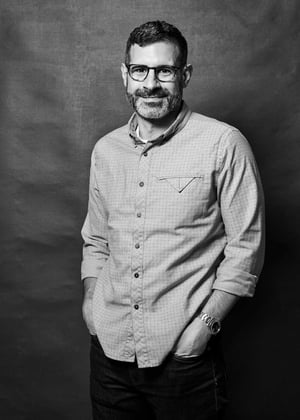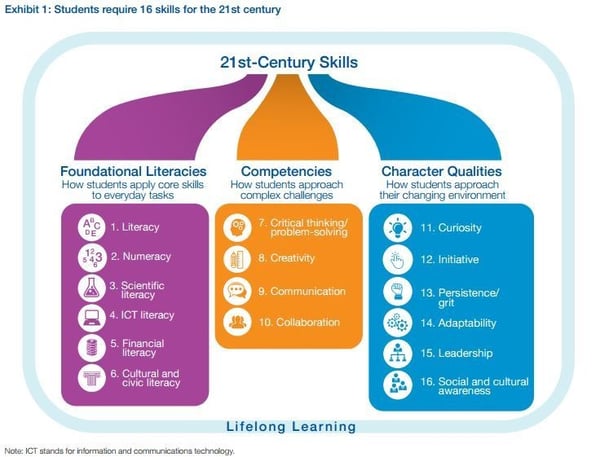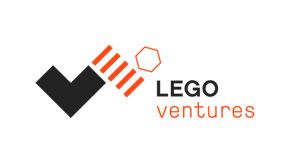Many of us grew up with the infamous little bricks from LEGO, bricks that we played with and built all sorts of imaginary worlds and kingdoms. While we may not have realized it at a young age, these bricks served as instruments for learning through play.
LEGO Ventures was founded in 2018 as an investment arm of the LEGO® Brand to pursue further opportunities related to the idea of learning through play. We sat down with Jamie Beaumont, Managing Partner at LEGO Ventures to discuss 21st-century skills, playing and learning as an adult, and resilience.
 Jamie, give us a quick introduction and background about yourself.
Jamie, give us a quick introduction and background about yourself.
I’m Jamie, I joined LEGO Ventures a year and a half ago and I lead the team here. Over the last 10 years, I’ve worn a number of hats, including CFO, COO, investment banker, auditor, and have spent time helping businesses on transformative journeys.
My passion has always been around company building, so my interest as a VC isn’t in saying ‘I picked and invested in that company’ and now they’re successful; I’m much more interested in helping a company grow, become great, and have impact. I enjoy being in the VC world, particularly at LEGO Ventures where we combine entrepreneurialism with fun and impact. The LEGO® Brand is still family owned and there’s still a real ethos to it.
LEGO Ventures is part of the LEGO® Brand which focuses on learning through play. Could you share more about this focus and why you have such strong beliefs in this investment area?
The LEGO® Brand is deeply trusted to provide opportunities for play that are rich and nutritious. When children play, they learn, and acknowledging this leads to the fundamental LEGO® Idea of Learning through Play, the belief that an experience that is hands-on, minds-on and intrinsically motivated makes for better learning. Five concepts form the core of this idea of learning through play:
- Actively engaging
- Meaningful
- Iterative
- Socially interactive
- Joyful
LEGO Ventures is born out of the core idea of learning through play because it’s so important. The LEGO brick and the LEGO system in play is an incredibly successful but single focus of this idea, thus LEGO Ventures exists to go beyond the brick. Where can our core idea be expanded, impactful, and commercialized?
“True innovation comes from the iterative process of trying something, understanding why it did or didn’t work, and learning what to do differently or better.”
How do you see this manifested in your founders and/or in your colleagues at the LEGO Group? Is this in reality a hard trait or skill to find in founders and if so, why?
In broad terms, an idea has one chance at success: it works or it doesn’t. A founder has several chances: they can pivot, adapt, change, and evolve, therefore the idea of being iterative is absolutely fundamental to being a good founder. If you’re overly dogmatic and can’t understand what’s happening, or can’t adapt and evolve, then your chances of success are severely hampered.
You’ll hear a lot of investors talk about how they invest in founders, and one of the reasons is that you want someone who has conviction and thinks in a way that places them in the future, but at the same time, you want someone who can evolve, adapt, and pivot their vision and ambition to follow where the opportunity really lies. There are a lot of statistics on how second, third, or fourth-time founders are more successful in general, which represents the need to learn along the journey of founding and growing a company, as well as the need to become more adaptable and open-minded in your approach of doing so. True innovation is a difficult trait to find and the rarity is why so few companies succeed.
How does the founder’s need to learn flexibility and true innovation for the 21st century drive a need to reconsider the traditional educational model?
We believe strongly in 21st-century skills, or “the 4 C’s,” which are:
- Critical thinking
- Collaboration
- Creativity
- Communication
If people learn these skills, they naturally have a mindset to question, to challenge, and thus to innovate. They have an innate mindset to communicate, collaborate, talk to others, listen to opinions, to challenge and be challenged, and to look at the evidence and see where it leads them. There needs to be an adaptation of education to focus on skills, not knowledge, which will lead to people with a higher-level skill set ready to go into the future work environment which is rapidly changing and to become successful entrepreneurs. They look at data (even data that’s changing daily), they consider advice and opinions, and filter through what’s relevant. Certainly these abilities will lead to better first-time founders more prepared for building and growing a company in a digital, global world.
At LEGO Ventures, you are very focused on the concept of play and the LEGO® Idea of Learning through Play. There is an implicit focus on children, but how do you think about play for adults and how that may manifest itself?
There’s no reason why adults shouldn’t ‘play’ or why learning shouldn’t be nutritious and fun. The traditional model of spending 18 years in education followed by 40 years of working is breaking down: people need to acquire new skills and capabilities and adapt throughout their entire lives.
Play is increasingly moving to the digital realm as well. We’re seeing digital-first learning or using digital products to supplement learning. Look at the evolution of play and where people go to have fun or wind down: there’s an increasing richness in what you’re able to do digitally and how to release the stresses and tensions of life. Those stresses and tensions grow as we get older, so the need for play experiences and escapism grows as we go from child to teenager to young adult and beyond. Our portfolio company Klang is a great example, they’re building a perpetual digital world that will give adults escapism and enjoyment in a meaningful, creative and collaborative way.
When we look at digital ‘places,’ lots of gamers play for hours, escaping to virtual worlds or metaverses. They literally build places - castles, forts, towns, villages - but digitally. These can be meaningful experiences, and the challenge is to make them available and engaging rather than passive. There’s also increasing awareness of mental wellbeing and providing adults with a play environment that allows them to express themselves in different ways and that don’t involve adrenaline, mounting stress levels, or tension, but are rather about creativity, collaboration, and communication. Technology is progressing to provide deeper and richer experiences that people increasingly want - we think there’s a huge opportunity here.
Let’s talk about 21st century skills. What would you consider as 21st century skills and how are they developed, both in youth and as an adult?
We look at the 4 C’s and the World Economic Forum’s framework which is slightly broader in scope and includes some knowledge-based skills. Creativity, collaboration, critical thinking, and communication are developed through integrated pedagogies, through project-based learning, play-based learning, and social learning where there are interdependencies and you have to think about solutions rather than just coming up with answers.
The world has had its biggest example of how these skills come to the fore with the COVID situation. You can’t solve the pandemic by knowing a lot about pandemics or viruses or the economy or human psychology. You need to interlace these disciplines and be creative to come up with real, implementable solutions.
We need education systems that promote project-based learning where you rely on multidisciplinary solutions and know how to navigate between them and assess different answers. Knowledge is accessible to most: if you want to know something, Google it. What you need to learn is how to evaluate the information when it’s thrown at you and what to do with it.
Truly developing 21st-century skills starts with understanding what those skills are, providing a framework for assessment (otherwise it’s hard to judge if you’re doing them well), providing the right tools, and actually developing skills through practice. Lots of people recognize the skills gap and come up with solutions, but public policy is behind on knowing what these solutions are and how to adopt them.
At LEGO Ventures, we try to find people with these kinds of solutions and the ability to break through, so that we can support their ideas and help bring them to fruition.
Let’s dive into the concept of resilience, and especially resilience through play. Could you give us an example of what you’re looking for in companies with respect to resilience through play? How do you look for resilience within your founders?
Resilience is something that's built through understanding and being able to contextualize events that are going on rather than letting them overwhelm you. Our portfolio company OKPlay is launching a product that allows parents to spend time with kids learning social and emotional skills. It’s a means to teach 3-years-olds the difference between happy and sad, anger, excitement and other emotions, and being able to recognize them, then learn how to process them and deal with them. Then you become more resilient naturally. It’s difficult in any form of short assessment process to identify resilience in a founder or a company; what you do is you look for people with experiences that they have been able to process and get through, that they’ve shown the ability to understand, contextualize, and move forward. You learn more through failure than success: it’s not a bad thing to meet a founder who has failed once, twice, or more. It's about understanding the founder’s story, what they’ve done, what they’ve learnt, and how they’ve dealt with failure.
Kids at an early age tend to be incredibly creative and imaginative, and we think that a lot of us lose such tendencies through schooling and/or higher education. How would you re-envision education or help us as adults regain some of our lost creativity? Following on from that, are there any business ideas you’d like to see in this area?
Education today is about learning skills, challenging perceptions, and building critical thinking using integrated pedagogies - or at least it should be. Keeping these three elements through our educational life would certainly reduce a loss of creativity and imagination in our adult years. The seismic shift away from knowledge transfer and into true 21st-century learning has started, but we’d really like to see that evolution speed up. It’s on everyone’s radar but we’re not at a tipping point where schools are adopting project-based and play-based learning.
As for us adults, the evolution that we long to see in the education system is one we also long to see for ongoing adult learning. I don’t just mean professional development or master’s degrees - I mean ways in our everyday lives where we can learn new skills, have our perceptions challenged, and build critical thinking.
Platforms that use data and algorithms to send us into echo chambers aren’t helping us build critical thinking skills, least of all creativity. The principle of ‘We know you like this and we’ll show you more of the same thing’ doesn’t breed the kind of learning that we need today. Where is the platform or product that uses data to fuel critical thinking by purposefully exposing you to the opinions of others and expanding your mind? We’d like to see a company that in simplistic terms can take a user from someone who for example, likes space travel, then is challenged to learn more about the science behind the universe and goes on to build experiments with rockets or create sci-fi stories. .
We’ll start to see creativity return when we make a focused effort to change the digital products we use or consume daily and the applications of data and algorithms from serving the company to serving the user.
We’re keen to meet founders that share our vision of the future and are equally as passionate about learning through play. Startups can apply directly for investment on our website at www.legoventures.com, or can find us on LinkedIn and Twitter to learn more.




